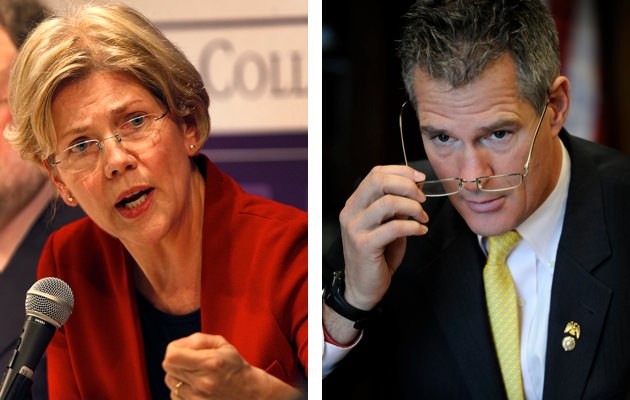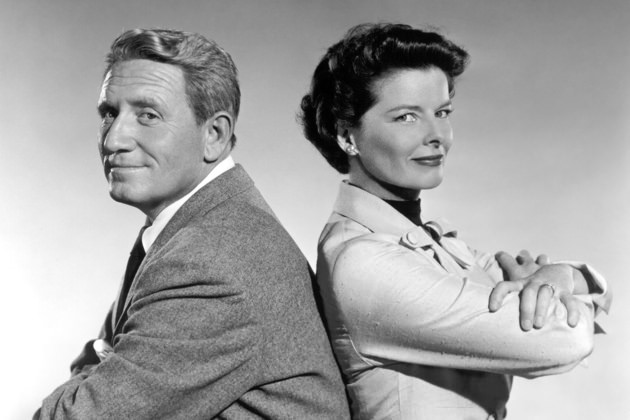It is hard to watch the verbal sparring between Elizabeth Warren and Scott Brown, the candidates in this fall’s closely watched Massachusetts Senate race for the “Kennedy seat,” without recalling the classic 1949 comedy Adam’s Rib. In that Spencer Tracy-Katharine Hepburn vehicle, Adam and Amanda Bonner are husband-and-wife lawyers who battle in the courtroom before ending up as Democratic and Republican rivals. “I’m not sure I care to expose myself,” Amanda says, “to typical instinctive masculine brutality.” Which invariably meets with Adam’s “Oh, come now” response.
Now, we have Warren adopting the Amanda pose, to Brown’s Adam. The pattern was set in a debate in early October when Warren, the feisty Democratic challenger and consumer advocate, was asked what she thought of Brown, the athletic incumbent and longtime professional model, posing nude for Cosmopolitan to pay his way through college. “I didn’t take my clothes off,” Warren said, to support her own education. “Thank God,” Brown remarked.
Both sides were predictably indignant, with Democrats deriding Brown’s joke as “frat-house” humor while Brown’s campaign manager tried to shame the opposition by saying that it was “elitist of Professor Warren to look down at the decisions Scott Brown made to put himself through college.”
Warren, a Harvard Law School professor who has been a special advisor to the Obama Administration, has been able to raise an astonishing $8.67 million during the second quarter of this year, much of it, it is suspected, from the entertainment industry in California still outraged at Brown’s victory in the special election to replace Ted Kennedy, in 2010, and eager to retain a majority in the Senate for Obama. (Brown raised $5 million during the same period—according to a new FEC report, it is now the most expensive Senate race in the country.) The money was presumably contributed to advance the debate on key issues important to Warren’s liberal constituents. They hope she will affirm “Obamacare” against Republican challengers (including Brown, who promises on his website to work to “repeal the entire bill”), while bringing the same regulatory muscle to protecting the environment that she exerted on deceptive credit-card fees.
Scott Brown’s backers, by contrast, tend to be motivated by issues such as a robust national defense, veterans’ affairs, and “job creation” (the latter at the expense, according to Warren supporters, of environmental protections such as the Clean Air Act, which Brown voted to gut). They see him as a maverick indebted to no one, who is unafraid to join Democrats on certain issues, such as his recent vote (along with Republican Senator Susan Collins of Maine) against the GOP measure extending all the Bush-era tax cuts. Warren’s supporters see votes like these as calculated attempts by Brown, who welcomed Tea Party support in 2010, to woo the independents who are viewed as swing votes in an election everyone expects to be close.
But the issue that has emerged most consistently in both campaigns—revealing perhaps a fundamental insecurity in both of these gaffe-prone candidates—is who is posing for what. Brown, a successful real-estate lawyer who wears a barn jacket and drives a pickup truck, likes to remind voters that he “didn’t go to Harvard, you know, I went to the school of hard knocks.” An abused child from a broken home, he attended Tufts and Boston College Law School. Yet Warren, a janitor’s daughter from Oklahoma, didn’t go to Harvard either: she was a scholarship student at George Washington University who completed her BA at the University of Houston, before getting a law degree, years later, from Rutgers. But Brown’s audience surely got the point.
The issue of posing reentered the contest with a vengeance when the Boston Herald revealed on April 27 that Harvard had counted Professor Warren as a Native American at a time when its law school was under fire for its dismal record in hiring people of color. Warren said that she had learned of the claim in the Herald article. Then, a few weeks later, she admitted (or remembered) that she had signed up as a Native American in national registers maintained to help colleges and universities identify promising candidates. Warren said she did so in order to connect with “people like me.”
Warren, who is blonde and blue-eyed, maintains that her Native American ancestry is a matter of “family lore,” and that a picture of her grandfather shows that he “had high cheek bones like all of the Indians do,” and yet, she has been unable to produce any documentation of her ancestry. In 1984 she contributed recipes to a cookbook with the unfortunate title Pow Wow Chow. Some of these, the Boston Herald pointed out, are almost identical to recipes by Pierre Franey, a former food writer for The New York Times, including “Crab with Tomato Mayonnaise Dressing.”
Advertisement
Responding to criticism from the embattled Warren campaign that he was dodging major issues by insulting Warren’s family, Senator Brown indulged in a bit of overreaching of his own. “Each and every day that I’ve been a United States senator,” he claimed recklessly, “I’ve been either discussing issues, meeting on issues, and [holding] secret meetings with kings and queens and prime ministers and business leaders and military leaders. Talking, voting, working on issues every single day. So, I don’t quite know what to say.” The last sentence, at least, was accurate.
In another variation on the theme of posing, Brown has declared war on poseurs. On the same day that the Supreme Court announced that it was upholding key provisions of President Obama’s health-care law, the Court struck down, as a violation of the First Amendment, a law known as “Stolen Valor,” which would make it illegal falsely to claim military decorations. Brown, who has served in the Army Reserve for over thirty years, sponsored legislation soon after the decision that prohibits anyone from profiting from such claims. “No one should be able to pose as someone they’re not to get benefits they don’t deserve,” Brown said.
Is it overconfidence or insecurity that makes us pose as someone we’re not, claiming to have had secret meetings with kings and queens or to have inherited American Indian recipes for tomato mayonnaise? A certain amount of self-fashioning, in Stephen Greenblatt’s phrase, would seem to lie deeply in the American grain. Are we not given the opportunity to be self-made men and women? Don’t we expect our politicians, in particular, to be good actors, even professional actors, in addition to being capable of good actions?
It’s clear, in any case, that Scott Brown and Elizabeth Warren have some additional self-fashioning to accomplish before the election. Brown, a likable man in a Spencer-Tracy-ish, one-of-the-guys mode, has not grown in the spotlight. He has said few memorable things since his “It’s the people’s seat” rejoinder to David Gergen’s patronizing question at a debate during the special election about whether he was prepared “to sit in Teddy Kennedy’s seat.” He seems to like people but is uncomfortable with crowds. At a conservation photo-op last year, at the Holyoke Range near where I live, he was met by a crowd of sign-waving protesters. After briefly greeting a handful of supporters, and taking no questions, he proceeded to sprint up the mountainside—he was dressed in running clothes—and left everyone in his wake. He looked great, as he always does, from a distance. Recently, he hired a speechwriter for Sarah Palin to jazz up his public image.
Warren, for her part, has to persuade voters that she’s not strident, professorial, and aloof. Democrats don’t want to watch a rerun of the special election, when the state’s Attorney General, Martha Coakley, showed no zest on the campaign trail and betrayed an aversion to shaking hands.
Massachusetts has a puzzling recent track record of launching candidates in nationally watched races who sputter towards the finish line: Dukakis and Kerry and Coakley and, for that matter, Mitt Romney, who has sputtered in a presidential race before. These New Englanders can seem, at key moments, to lack the common, the authentic, the Kennedy touch. Their efforts to “connect”—zooming around in tanks, claiming to love NASCAR, enhancing their ancestry—can run awry. Under the circumstances, conspicuous posing can seem like an imposition on real political choices while authenticity—the real, the elusive thing—may be what voters are looking for, especially in a contest like this one, with far-reaching consequences for voters in the state and in the nation.




